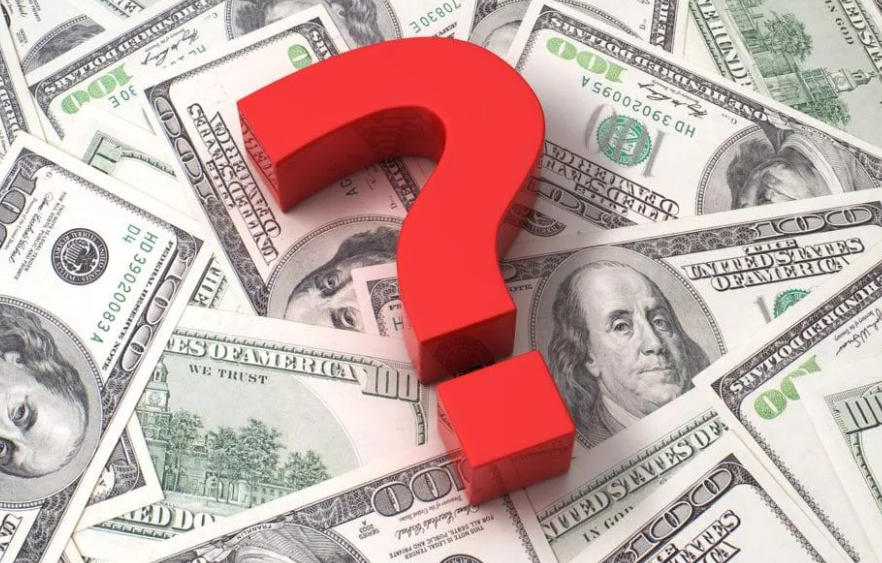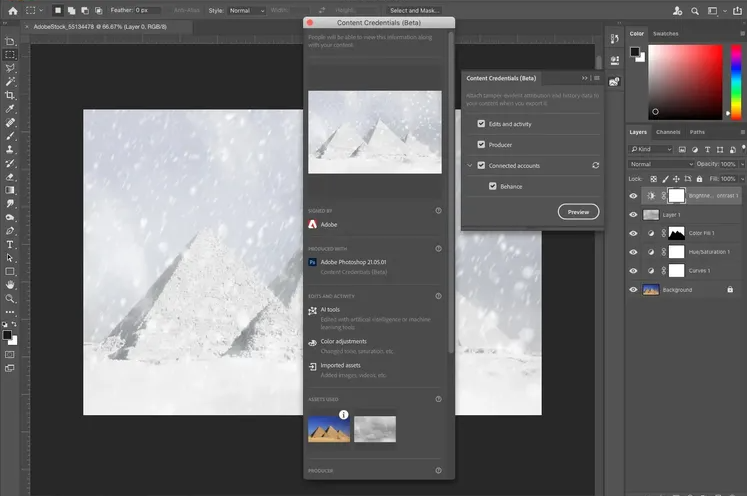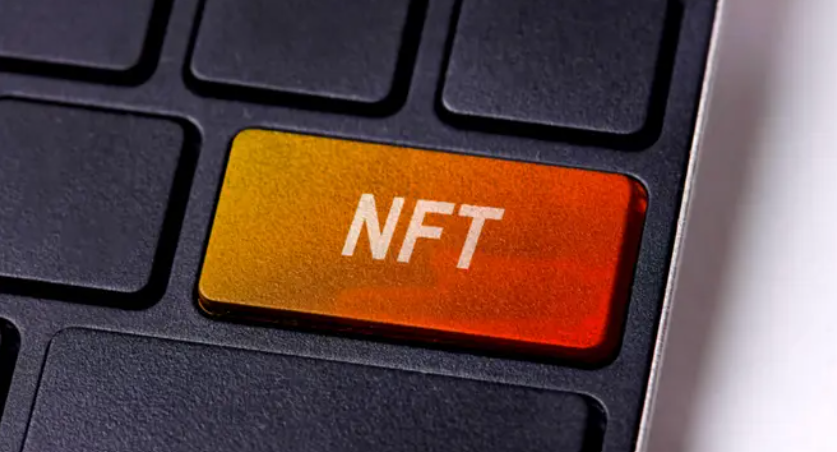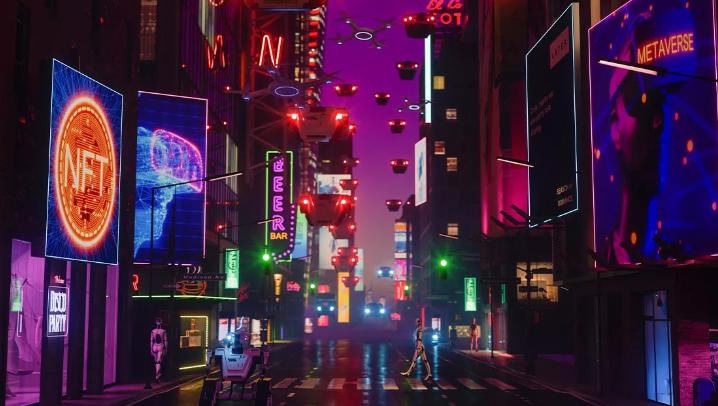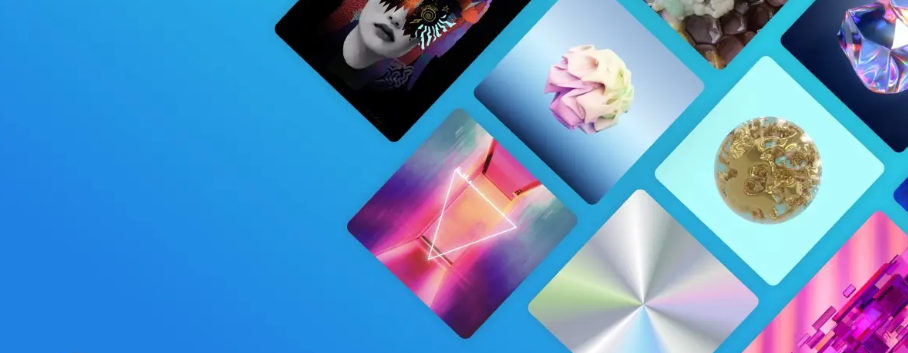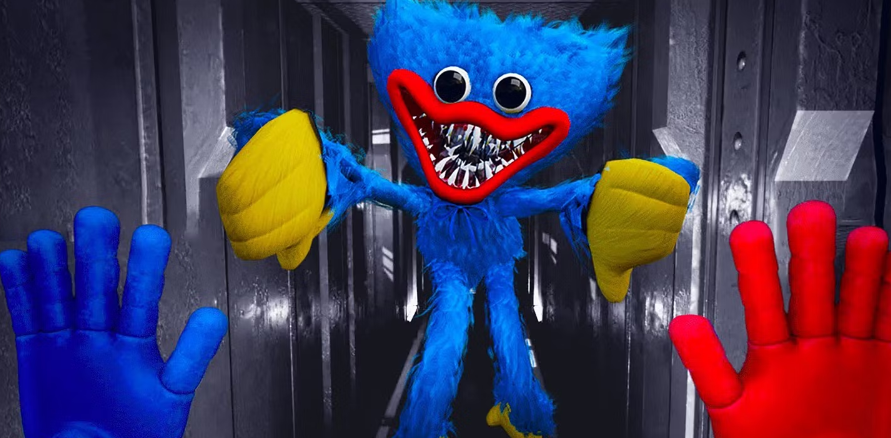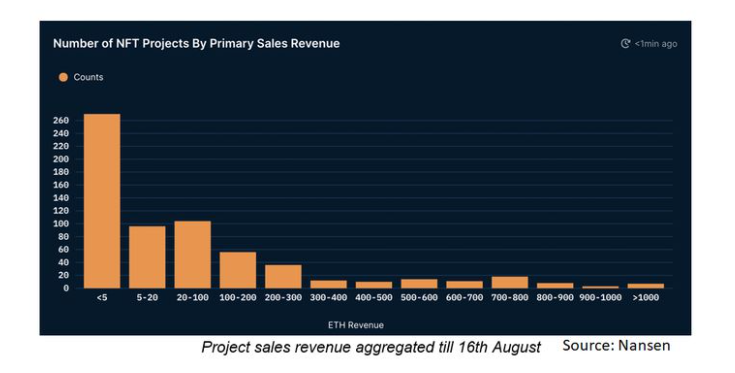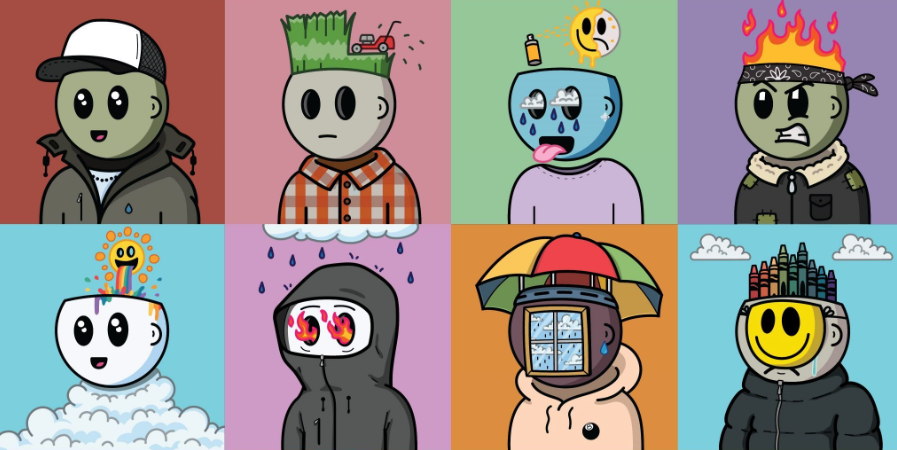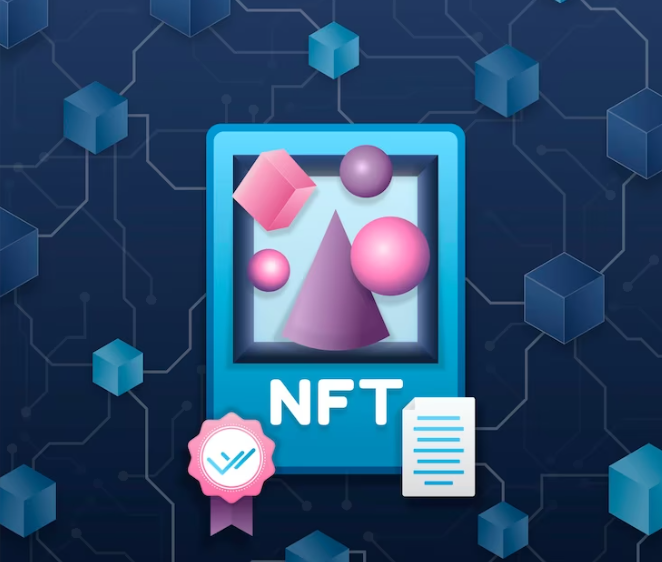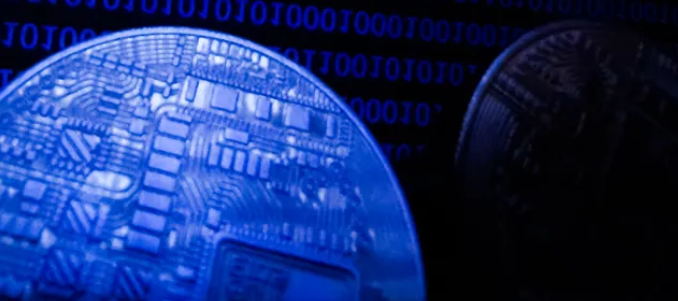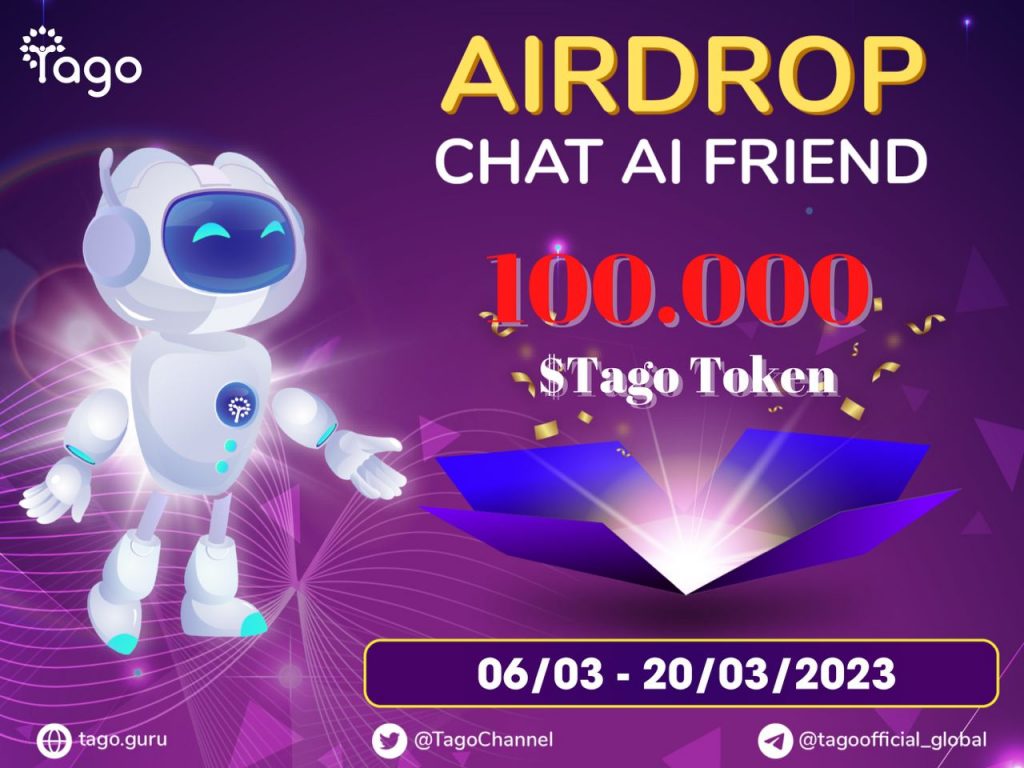As the digital world is evolving, it is unfolding several innovative new age income opportunities that entrepreneurs and businesses are seizing. One of these lucrative new business models is the NFT marketplace. The idea of building an NFT marketplace is appealing to many blockchain enthusiast companies and entrepreneurs as they have witnessed the obsession of traders with NFTs. Images, trading cards, video clips, digital artwork, domain names, and any physical asset (tangible or intangible) that has the potential to become a digital asset can be represented by an NFT token and then traded on NFT marketplaces.
For their ability to verify ownership of digital assets through immutable records on the Blockchain, NFTs have received worldwide recognition as a new business entity. They are the latest items of a fad in the global crypto market, especially among artists, collectors, luxury brands, and sports franchises. NFT values are volatile like cryptocurrencies, and values are typically driven by demand and popularity. An NFT can attract huge values in the millions, which is why they have attracted massive attention from traders in a short period.
However, we won’t be talking about NFT today; rather, we will talk about its trading platform i.e. the NFT market. If you want to read about NFTs in detail, you can check out our NFT-specific information here. NFT markets are built on various Blockchain platforms such as Binance, Solana, Cardano, Ethereum, TRON, etc. This article will focus on the development of the Cardano NFT market.
Cardano is a third-generation proof-of-stake blockchain platform that has been developed through evidence-based methods based on peer-reviewed research. It has been developed to solve the pain points of scalability, interoperability and sustainability in distributed systems. The immutability of Cardano’s blockchain distributed ledger technology protects transaction details and eliminates the possibility of false transactions and cyber-attacks in NFT markets.
What is an NFT Marketplace?
As the name suggests, the NFT marketplace is the platform where NFT creators and investors participate in buying, selling, and trading NFTs. In NFT markets, the most common NFT creators are digital artists, music artists, video creators, gamers, game producers, art galleries, luxury brands, and influencers. Interested investors are usually art collectors, gamers, and keen cryptocurrency traders.
NFT marketplaces are open and decentralized platforms for artists to monetize their artwork by directly reaching the audience without involving any middleman. That is why more and more artists are leaning towards using NFT markets. Another main reason why NFT marketplaces are preferred is that they provide artists with access to primary and secondary markets. As you know, NFTs are immutable and verifiable proofs of ownership, so an NFT artist or creator can always prove their copyright to an NFT. Even when NFTs are traded on the secondary market and ownership changes hands, the original NFT creator continues to receive royalties.
As the popularity of NFTs increases, more investors and traders use NFT markets to buy, hold, and then sell NFTs for profit through price appreciation. Specialized NFT marketplaces for audio and video, arts, gaming, and real estate assets are emerging to provide specific audiences with more personalized features for better user experiences. These specialized NFT marketplaces are not just for NFT trading, but function as social platforms for creators and investors to come together.
What are the key features of an NFT marketplace?
Cardano, Solana, Ethereum, Tezos, almost all the blockchain protocols support the development of the NFT market. Although the specialty of an NFT exchange is the result of the main features of its main blockchain protocol, the interface of each NFT exchange has certain must-have features, such as:
Storefront
The dashboard provides collective information of an NFT: its owners, preview or price history.
Advanced token search
Supports tagging and category management for advanced search features
Filters
It makes navigation easy, allowing users to select items by payment method, category, listing status, and collection.
Listing Creation
It allows users to create and maintain the collection of their NFTs, along with token information such as name, tags, and description.
Offer option
Users can bid on the NFTs listed on the platform
Wallet Integration
Wallets are required to store, send and receive non-fungible tokens.
Ratings
Provides an insight into which NFTs are trending or in demand
Blockchain protocols specify their NFT standards and also provide tools for developers. The developers choose the storage platforms and frontend frameworks based on the requirement or priority of the project.
What Is The Cardano Blockchain?
As mentioned above, different blockchain protocols allow the development of the NFT market on top of it. Today we will talk about the Cardano blockchain and understand the development of the NFT market in the context of Cardano.
The creators of Cardano have positioned it as the third generation blockchain because it has been designed to solve the scalability, interoperability and sustainability points in the first and second generation blockchains. Cardano is also the first Blockchain developed through peer-reviewed research and evidence-based methods. Even its output efficiency is higher and better than that of Ethereum, according to industry experts.
Developers love to develop on Blockchain like Cardano for its five key features:
- Its consensus mechanism and protocol, Proof-Of-Stake and Ouroboros, respectively, are energy efficient, provide a secure environment for transactions, and offer sustainable performance.
- Being developed using evidence-based methods, Cardano is suitable for developing high-risk applications and can act in response to emerging requirements and innovations.
- Its unmatched security opens up entirely new opportunities and markets.
- It has an incentive mechanism that rewards users for their contributions as developers, staking pool operators, or staking delegators.
- Unlike other blockchains, Cardano does not use exponential energy to increase performance and add blocks.
Why Consider Cardano NFT Market Development?
As discussed so far, the Cardano blockchain exhibits the potential to attract a larger crypto audience. Also in the context of the development of the NFT market, Cardano offers significant benefits, as mentioned below, and has become one of the preferred blockchains for building NFT platforms.
- Increased traffic on an NFT marketplace hampers the performance of the system. Without scalability, Blockchain cannot handle the increasing traffic. Cardano achieves high scalability by solving the problems related to transactions per second, network bandwidth, and data storage.
- Its proof-of-stake consensus mechanism ensures high transaction speed.
- It uses a technique called RINA to subnet the network, reducing the bandwidth requirement of each node.
- It uses techniques like pruning, compression, and partitioning to address the problem of data storage.
- The proof-of-stake consensus mechanism is committed to providing a highly secure environment as 51% of the stake is held by honest stakers. New iteration and security analysts continue to strengthen the security of the protocol.
- Cardano ensures strong ownership tracking and maintains comprehensive records on the origin or history of Cardano NFTs.
- It has a well-designed revenue model and earns money in different ways.
- Being open source and through incentives, it attracts continued support of the protocol development community, which boasts of its sustainability.
- Interoperability is another key strength of Cardano. It allows multiple coins to exist side by side and move seamlessly across multiple chains.
- It is a scalable and technologically flexible chain that is based on facts, uses specialized smart contract platforms such as Plutus and Marlowe, and offers higher performance with lower transaction costs.
A Cardano NFT marketplace is a secure, non-custodial solution for those looking to buy and sell their Cardano NFTs. If you are interested in learning how to mint Cardano NFTs, check out this information.
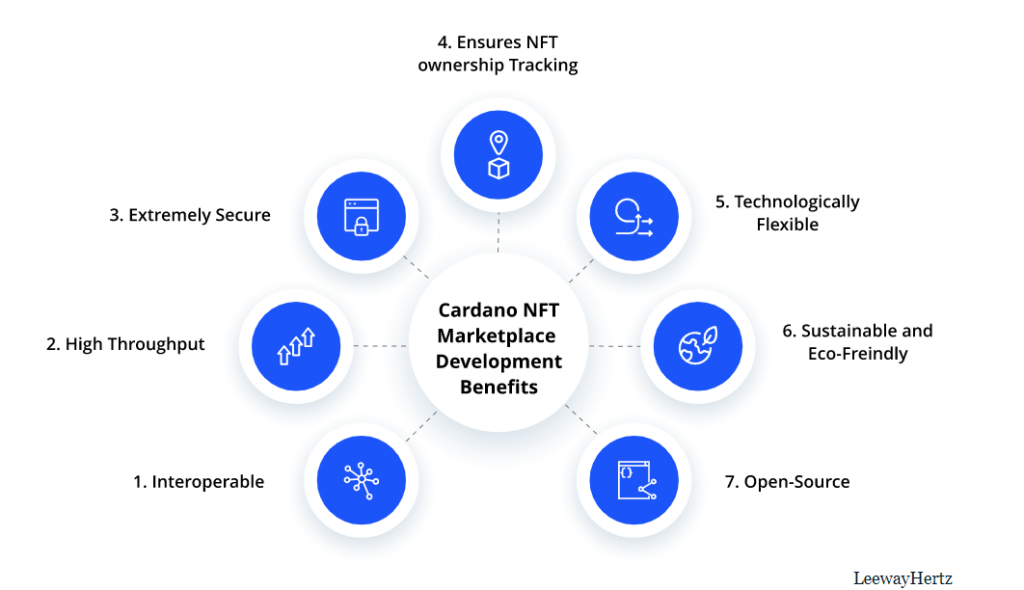
How to build an NFT market on Cardano?
By launching your own NFT marketplace, you can offer creators and collectors around the world the opportunity to access primary and secondary markets to buy and sell their digital assets through NFTs. The platform facilitates direct trading between buyers and sellers without involving any middleman.
Target niche definition
Before building an NFT marketplace, the first step is to define the platform’s target niche, such as digital artists, audio and video content creators, gaming enthusiasts, or collective users.
Configuring prerequisites for specific blockchains.
NFT markets are developed on multiple blockchains. If you choose to build your marketplace on Cardano, you must first set up Cardano node ownership; is one of the prerequisites. Developers should have a basic understanding of the Cardano command line interface necessary to build an NFT platform on Cardano.
Defining user roles
Before developing the user interface of your NFT platform, it is important to define user roles to ensure the best user experiences for both creators and traders.
UI design
The user interface of your marketplace plays a key role in defining the user experience. The user interface should be designed with convenience of use for both buyers and sellers in mind. An NFT marketplace requires hosting multiple features and displaying live price updates. Therefore, a high performance and clean user interface design is needed to ensure easy navigation and consistency at all times for users. The UI design should also be scalable to accommodate new features and functionality in the future.
Development, audit and integration of smart contracts
The next step is to develop smart contracts to detail the terms of sale between a buyer and a seller and store the codes of the self-executing digital contract on the Cardano network. On Cardano, you can develop smart contracts using three specific development languages: Marlowe, Plutus, and Haskel. Each language has specific properties. So, based on your requirements, you can choose any of the languages for your smart contract.
Wallet integration
In the Cardano NFT marketplace, all transactions are usually done via ADA, Cardano’s native token. It would be helpful if you integrate Nami Wallet for buyers and sellers to work with NFTs. However, to appeal to a broader customer base, you may want to integrate multiple crypto wallets. The Wallet will not contain the NFT files; rather, it will only store the information of the NFT transactions. The information stored in the Wallet will point to the location of the owner’s files stored on the Blockchain. NFT storage solutions are needed to store the NFT files.
Feature Integration
The Cardano NFT marketplace supports a variety of features. Integrating the must-have features of the marketplace such as shop, portfolio integration, offer options, search filters are necessary to make the marketplace functional; there is no limit on the integration of functions. As with any software, you can choose to enhance the marketplace’s user interface through innovative features.
Customer tests
To ensure code correctness, run extensive property-based tests on multiple Cardano-specified testnets and then launch on the mainnet to engage the mass audience. Rigorously optimize the platform during client testing.
NFT storage solution
A robust NFT storage solution is needed to store NFT data off-chain. There are different decentralized storage solutions to choose from. IPFS is popular and helps NFT marketplace creators and owners to store data in a decentralized way.
Final Note: Start Your NFT Market on Cardano with LeewayHertz
We are a team of enthusiastic blockchain developers, committed to designing and developing high-potential, innovative blockchain solutions, including NFT markets. If you are looking to launch your own NFT Marketplace on the Cardano blockchain, we can help you with end-to-end development services. Our NFT marketplace development is comprehensive across Blockchain, storage solutions, NFT standards, and frontend frameworks.
If you are interested in launching your Cardano-based decentralized NFT marketplace to attract NFT traders from around the world, connect with our Cardano blockchain experts.


